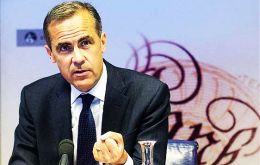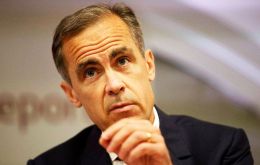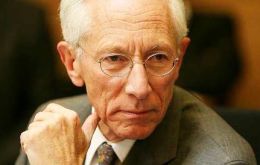MercoPress. South Atlantic News Agency
Tag: Mark Carney
-
Friday, March 17th 2017 - 07:15 UTC
Bank of England cautiously leaves interest rates at the record low of 0.25%

The Bank of England (BOE) held interest rates at the record low level of 0.25% and maintained asset purchases at £435 billion on Thursday. The decision, which was made by an 8-1 majority, had been almost unanimously anticipated by central bank watchers with many expecting the BOE to choose caution until more clarity emerges on the Brexit process and the U.K. economy's capacity to manage outside of the European Union.
-
Friday, February 3rd 2017 - 11:23 UTC
Bank of England forecasts strong economic growth in next three years

The Bank of England revised up its economic growth forecasts for the British economy for the coming three years, crediting much of the improvement to the government’s decision to ease up on austerity in the wake of the country’s vote to leave the European Union.
-
Saturday, November 5th 2016 - 09:49 UTC
Bank of England raises inflation and growth forecasts, but Brexit uncertainty remains

The Bank of England has raised its near-term growth and inflation forecasts on Thursday following the slide in sterling seen since the U.K.'s decision to leave the European Union. The bank decided Thursday to keep interest rates at the record low level of 0.25% and maintan its quantitative easing (QE) purchase targets at up to £10 billion for corporate bonds and £435 billion for U.K. government bonds.
-
Tuesday, November 1st 2016 - 02:05 UTC
Bank of England governor will step down in June 2019, after Brexit is over

Bank of England governor Mark Carney says he will step down in June 2019. It means he will serve one additional year beyond the five-year term he committed to when he took the post, but will still be two years short of the usual eight years governors serve.
-
Friday, August 5th 2016 - 12:07 UTC
UK admits economy contraction and announces a bold package of stimulus measures

The Bank of England has unveiled a series of stimulus measures in the wake of Brexit, including its first interest rate cut since the global financial crisis (2009), as it tries to jumpstart an economy shocked by Britain’s vote to leave the European Union.
-
Friday, May 13th 2016 - 11:43 UTC
Bank of England warns about Brexit dangers, and triggers major controversy

The Bank of England has given its starkest warning yet that a UK vote to leave the EU could hit the economy. Mark Carney, the Bank's governor, warned that the risks of leaving “could possibly include a technical recession”.
-
Wednesday, April 20th 2016 - 06:15 UTC
Bank of England says it has a duty to talk about the Brexit referendum

It is the Bank's duty to talk about the European Union referendum risks, argues the Bank of England governor Mark Carney, dismissing accusations the Bank is too political. The referendum takes place on 23 June and has become highly controversial.
-
Wednesday, September 2nd 2015 - 08:30 UTC
Despite China, for the Fed and BoE, an interest rate raise still on the table

United States inflation will likely rebound as pressure from the dollar fades, allowing the Federal Reserve to raise interest rates gradually, Fed Vice Chairman Stanley Fischer said on Saturday in a speech careful not to overreact to a possible Chinese slowdown.
-
Saturday, August 8th 2015 - 08:22 UTC
Bank of England keeps rates unchanged; little talk of rise because of China and Greece

UK interest rates have been held at 0.5% again by the Bank of England's Monetary Policy Committee (MPC). Members voted 8-1 to keep rates on hold - the first time for months the decision has not been unanimous, with Ian McCafferty voting for an increase.
-
Wednesday, August 5th 2015 - 07:25 UTC
UK government begins sale of rescued RBS, but a third below the price it paid

The British government has begun its sell-off of shares in part-nationalized lender Royal Bank of Scotland, raising £2.1bn, a third below the price it paid. It sold a 5.4% stake at 330p a share, a 7.6p discount on Monday's closing price.
